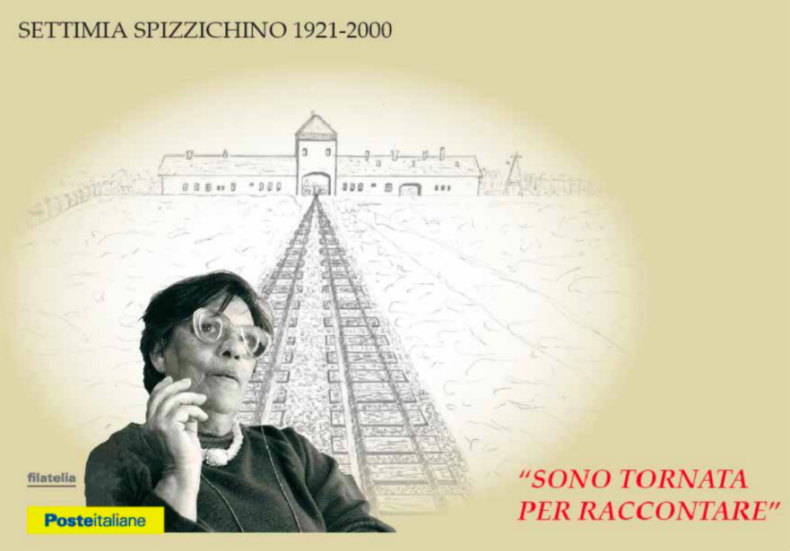A postage stamp honors Settimia Spizzichino “Her commitment to Memory is exemplary”

A great stamp-collecting enthusiast, Settimia Spizzichino had a special relationship with the Poste Italiane, the national postal service: for almost 30 years, she was a perforator operator. An unforgettable voice of Memory, the only woman to return after being captured during the raid of the Ghetto of Rome on 16 October 1943, she was born in Rome on April 15th 1921. Then to be born “a second time”, she recalled, on the day of her 24th birthday. That is when the British came to liberate her, putting an end to the nightmare that took the names of Auschwitz-Birkenau, where she was also a victim of experiments, and then of Bergen-Belsen.
“I want to remember everything about my life, even that terrible experience called Auschwitz. For this, I believe, I came back: to talk about it”, this what she told anyone who asked her about her past in the concentration camp. A beacon of courage, determination and civic commitment that stands out even in the special homage made by the Italian Ministry of economic development on this symbolic day: the issuing of a celebrative postage-stamp.
The cancellation, which took place on the premises of the UCEI Bibliographic Centre, was the result of a request from the Union of the Italian Jewish Communities. To retrace the reasons was President Noemi Di Segni, who had remembered the other value in the path followed by Settimia in encountering the new generations. An interaction characterized by the awareness, from the witnesses of the Shoah themselves, that on the other side there will be someone “to receive the example” that there will be life “even after us”.
An exemplary figure even for the vice-minister Gilberto Pichetto Fratin, who spoke of the postage-stamp as “a small vaccine that we introduce in 300 thousand doses so that it can remain a warning, in memory of all”. For Antonio Palma, president of the State Mint Printing Institute, this is an action of Memory “that reminds us what happened” and what is “morally to be censored”. In this sense very serious, then Palma stated, “the complicity of the Italian society”.
A theme explored in a reconstruction of Amedeo Osti Guerrazzi related to the facts of 16th October. It is a common error, signalled the scholar of the Museum of Shoah Foundation, to limit the raid in the area of the ex-Ghetto. The raid happened throughout the city instead. And so, everyone “saw”, everyone “knew”. Many silences weigh on that day’s scale. That of the “political, moral and religious authority”. The Vatican was silent, points out the scholar, but also silent were “many regular citizens”.
Enrico Menegazzo, commercial manager of Poste Italiane, in starting the cancellation has defined the stamp “a paper stumbling block, which can convey a story that must not be forgotten”. To conclude the ceremony, conducted by the editor of UCEI Guido Vitale, a testimony of Carla Di Veroli, niece of the Roman witness. In his words the gratitude for having brought to completion this result but also the commitment to continue vigorously on the path of values and principles indicated, with great fortitude, by Settimia. Among those present was the UCEI Secretary-General Uriel Perugia.
You can replay the ceremony on the Facebook channel on the UCEI webtv.
Translated by Oyebuchi Lucia Leonard and revised by Antonella Losavio, students at Trieste University and the Advanced school for Interpreters and Translators of Trieste University, interns at the newspaper office of the Union of the Italian Jewish Communities.
